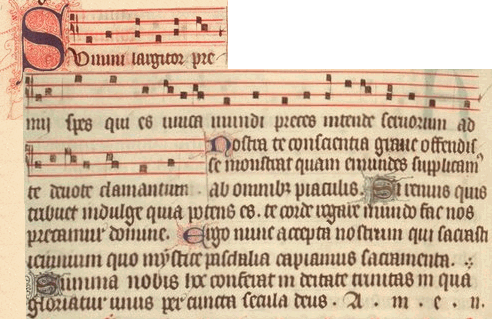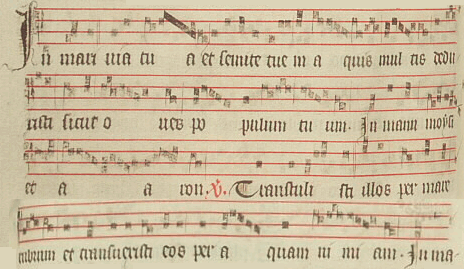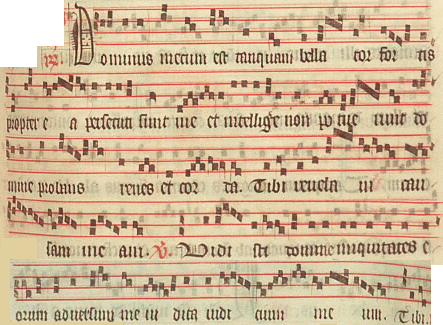READINGS: LENT SATURDAY III

Invitatory Psalm & BACK

PSALMS and BACK
ὁ δὲ ποιῶν τὴν ἀλήθειαν ἔρχεται πρὸς τὸ φῶς, — ἵνα φανερωθῇ αὐτοῦ τὰ ἔργα.
Even Years: Exodus 40:16-38 וַיַּעַשׂ מֹשֶׁה כְּכֹל אֲשֶׁר צִוָּה יְהוָה אֹתוֹ כֵּן עָשָׂה׃ וַיְהִי בַּחֹדֶשׁ הָרִאשׁוֹן בַּשָּׁנָה הַשֵּׁנִית בְּאֶחָד לַחֹדֶשׁ הוּקַם הַמִּשְׁכָּן׃ וַיָּקֶם מֹשֶׁה אֶת־הַמִּשְׁכָּן וַיִּתֵּן אֶת־אֲדָנָיו וַיָּשֶׂם אֶת־קְרָשָׁיו וַיִּתֵּן אֶת־בְּרִיחָיו וַיָּקֶם אֶת־עַמּוּדָיו׃ וַיִּפְרֹשׂ אֶת־הָאֹהֶל עַל־הַמִּשְׁכָּן וַיָּשֶׂם אֶת־מִכְסֵה הָאֹהֶל עָלָיו מִלְמָעְלָה כַּאֲשֶׁר צִוָּה יְהוָה אֶת־מֹשֶׁה׃ וַיִּקַּח וַיִּתֵּן אֶת־הָעֵדֻת אֶל־הָאָרֹן וַיָּשֶׂם אֶת־הַבַּדִּים עַל־הָאָרֹן וַיִּתֵּן אֶת־הַכַּפֹּרֶת עַל־הָאָרֹן מִלְמָעְלָה׃ וַיָּבֵא אֶת־הָאָרֹן אֶל־הַמִּשְׁכָּן וַיָּשֶׂם אֵת פָּרֹכֶת הַמָּסָךְ וַיָּסֶךְ עַל אֲרוֹן הָעֵדוּת כַּאֲשֶׁר צִוָּה יְהוָה אֶת־מֹשֶׁה׃ וַיִּתֵּן אֶת־הַשֻּׁלְחָן בְּאֹהֶל מוֹעֵד עַל יֶרֶךְ הַמִּשְׁכָּן צָפֹנָה מִחוּץ לַפָּרֹכֶת׃ וַיַּעֲרֹךְ עָלָיו עֵרֶךְ לֶחֶם לִפְנֵי יְהוָה כַּאֲשֶׁר צִוָּה יְהוָה אֶת־מֹשֶׁה׃ וַיָּשֶׂם אֶת־הַמְּנֹרָה בְּאֹהֶל מוֹעֵד נֹכַח הַשֻּׁלְחָן עַל יֶרֶךְ הַמִּשְׁכָּן נֶגְבָּה׃ וַיַּעַל הַנֵּרֹת לִפְנֵי יְהוָה כַּאֲשֶׁר צִוָּה יְהוָה אֶת־מֹשֶׁה׃ וַיָּשֶׂם אֶת־מִזְבַּח הַזָּהָב בְּאֹהֶל מוֹעֵד לִפְנֵי הַפָּרֹכֶת׃ וַיַּקְטֵר עָלָיו קְטֹרֶת סַמִּים כַּאֲשֶׁר צִוָּה יְהוָה אֶת־מֹשֶׁה׃ וַיָּשֶׂם אֶת־מָסַךְ הַפֶּתַח לַמִּשְׁכָּן׃ וְאֵת מִזְבַּח הָעֹלָה שָׂם פֶּתַח מִשְׁכַּן אֹהֶל־מוֹעֵד וַיַּעַל עָלָיו אֶת־הָעֹלָה וְאֶת־הַמִּנְחָה כַּאֲשֶׁר צִוָּה יְהוָה אֶת־מֹשֶׁה׃ וַיָּשֶׂם אֶת־הַכִּיֹּר בֵּין־אֹהֶל מוֹעֵד וּבֵין הַמִּזְבֵּחַ וַיִּתֵּן שָׁמָּה מַיִם לְרָחְצָה׃ וְרָחֲצוּ מִמֶּנּוּ מֹשֶׁה וְאַהֲרֹן וּבָנָיו אֶת־יְדֵיהֶם וְאֶת־רַגְלֵיהֶם׃ בְּבֹאָם אֶל־אֹהֶל מוֹעֵד וּבְקָרְבָתָם אֶל־הַמִּזְבֵּחַ יִרְחָצוּ כַּאֲשֶׁר צִוָּה יְהוָה אֶת־מֹשֶׁה׃ וַיָּקֶם אֶת־הֶחָצֵר סָבִיב לַמִּשְׁכָּן וְלַמִּזְבֵּחַ וַיִּתֵּן אֶת־מָסַךְ שַׁעַר הֶחָצֵר וַיְכַל מֹשֶׁה אֶת־הַמְּלָאכָה׃ וַיְכַס הֶעָנָן אֶת־אֹהֶל מוֹעֵד וּכְבוֹד יְהוָה מָלֵא אֶת־הַמִּשְׁכָּן׃ וְלֹא־יָכֹל מֹשֶׁה לָבוֹא אֶל־אֹהֶל מוֹעֵד כִּי־שָׁכַן עָלָיו הֶעָנָן וּכְבוֹד יְהוָה מָלֵא אֶת־הַמִּשְׁכָּן׃ וּבְהֵעָלוֹת הֶעָנָן מֵעַל הַמִּשְׁכָּן יִסְעוּ בְּנֵי יִשְׂרָאֵל בְּכֹל מַסְעֵיהֶם׃ וְאִם־לֹא יֵעָלֶה הֶעָנָן וְלֹא יִסְעוּ עַד־יוֹם הֵעָלֹתוֹ׃ כִּי עֲנַן יְהוָה עַל־הַמִּשְׁכָּן יוֹמָם וְאֵשׁ תִּהְיֶה לַיְלָה בּוֹ לְעֵינֵי כָל־בֵּית־יִשְׂרָאֵל בְּכָל־מַסְעֵיהֶם׃ | 16 Moses did this; he did exactly as Yahweh had ordered him. 17 On the first day of the first month in the second year the Dwelling was erected. 18 Moses erected the Dwelling. He fixed its sockets, set up its frames, put its crossbars in position and set up its poles. 19 He spread the tent over the Dwelling and the covering for the tent over that, as Yahweh had ordered Moses. 20 He took the Testimony and put it in the ark, positioned the shafts on the ark and put the mercy-seat on top of the ark. 21 He brought the ark into the Dwelling and put the screening curtain in place, screening the ark of the Testimony, as Yahweh had ordered Moses. 22 He put the table inside the Tent of Meeting, against the side of the Dwelling, on the north, outside the curtain, 23 and on it arranged the loaves before Yahweh, as Yahweh had ordered Moses. 24 He put the lamp-stand inside the Tent of Meeting, opposite the table, on the south side of the Dwelling, 25 and set up the lamps before Yahweh, as Yahweh had ordered Moses. 26 He put the golden altar inside the Tent of Meeting, in front of the curtain, 27 and on it burnt fragrant incense, as Yahweh had ordered Moses. 28 He then put the screen at the entrance to the Dwelling. 29 He put the altar of burnt offerings at the entrance to the Dwelling, to the Tent of Meeting, and on it offered the burnt offering and cereal offering, as Yahweh had ordered Moses. 30 He put the basin between the Tent of Meeting and the altar and put water in it for the ablutions, 31 where Moses, Aaron and his sons washed their hands and feet, 32 whenever they entered the Tent of Meeting or approached the altar they washed, as Yahweh had ordered Moses. 33 He then set up the court round the Dwelling and the altar and set up the screen at the gate-way to the court. Thus Moses completed the work. 34 The cloud then covered the Tent of Meeting and the glory of Yahweh filled the Dwelling. 35 Moses could not enter the Tent of Meeting, since the cloud stayed over it and the glory of Yahweh filled the Dwelling. 36 At every stage of their journey, whenever the cloud rose from the Dwelling, the Israelites would resume their march. 37 If the cloud did not rise, they would not resume their march until the day it did rise. 38 For Yahweh's cloud stayed over the Dwelling during the daytime and there was fire inside the cloud at night, for the whole House of Israel to see, at every stage of their journey. | ||
Odd Years: Hebrews 6:13-20 τῷ
γὰρ Ἀβραὰμ
ἐπαγγειλάμενος
ὁ θεός,
Hebrews 6:13-20 13 When God made the promise to Abraham, he swore by his own self, since there was no one greater he could swear by: 14 I will shower blessings on you and give you many descendants. 15 Because of that, Abraham persevered and received fulfilment of the promise. 16 Human beings, of course, swear an oath by something greater than themselves, and between them, confirmation by an oath puts an end to all dispute. 17 In the same way, when God wanted to show the heirs of the promise even more clearly how unalterable his plan was, he conveyed it by an oath 18 so that through two unalterable factors in which God could not be lying, we who have fled to him might have a vigorous encouragement to grasp the hope held out to us. 19 This is the anchor our souls have, reaching right through inside the curtain 20 where Jesus has entered as a forerunner on our behalf, having become a high priest for ever, of the order of Melchizedek.
| | ||
Even Years: Gregory Nazianzen, Talk 14 on love of the poor, 38,40 (PG 35, 907-910) Μακάριοι,
φησὶν, οἱ ἐλεήμονες,
ὅτι αὐτοὶ ἐλεηθήσονται.
Οὐ πολλοστὸς ἐν
τοῖς
μακαρισμοῖς ὁ ἔλεος.
Καὶ, Μακάριος ὁ
συνιὼν, ἐπὶ
πτωχὸν καὶ πένητα·
καὶ, Χρηστὸς ἀνὴρ
ὁ οἰκτείρων καὶ
κιχρῶν· καὶ, Ὅλην
τὴν ἡμέραν ἐλεεῖ
καὶ δανείζει ὁ δίκαιος.
Ἁρπάσωμεν τὸν
μακαρισμὸν,
συνιέντες
κληθῶμεν,
χρηστοὶ γενώμεθα.
Odd Years: Augustine of Hippo, Treatise on John 84, 1 (CCL 39, 1176-1177)
|
| Prayer |

